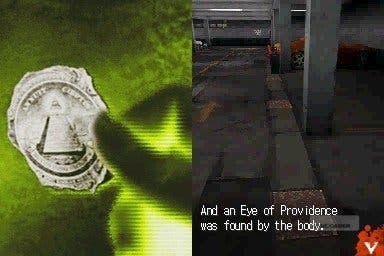Again
Thanks for the memories.
The Vision sections are broken in their own way. Movement is hilariously slow, not only as you trundle about an area like an arthritic snail, but also as you sweep at the screen over and over to attempt, say, looking at the floor. Reconstructing the past requires you to have what it calls Vision Flashes, which feel superfluous and frustrating. If you've solved how to reconstruct something, the game simply won't let you before you've flashed. But then it also penalises you for attempting to flash in the 'wrong' place. What's right and wrong is extremely ambiguous, plus you've a limited bar of psychic power to attempt this – and if it runs out, you die. Which is odd. It seems to be emulating Phoenix Wright, but managing to get the idea even more wrong.
As the game progresses you have very many accessible locations at any one time, and no useful direction. It's most peculiar, the game grabbing you roughly by the wrist and dragging you through acres of linear, choice-less conversations in the order it prescribes, then suddenly dumping you confused with no idea about where to go next. At one point you've got to find some cigarettes (for a completely ludicrous puzzle) and the expectation of the player is to visit every available place and aimlessly ask about it. When the completely unlikely correct place is found, even the game's characters comment about how unexpected it was to find them there.
All of which is to ignore Cing's trademark intelligence. Like Hotel Dusk, characters exist in a real-world/artistic hybrid. Here photographs of real people are used, smartly animated and without looking tacky. But their pictures are surrounded by a thick, white outline against the photographed backgrounds, and even more interestingly, their forms degrade into animated scribbling. When you enter a new location, the silhouetted form of J walks across a black background, painting in the scene behind him. (The effect is somewhat spoiled by his form looking rather like his penis is hanging out and flapping around, which is more than a little distracting.)

This sophisticated understanding of mise-en-scène, and the questions it asks about reality and fantasy, is Cing's trademark. Moving from Hotel Dusk's pencil sketches to Again's eroding photographs is fascinating. (Sadly, the studio has now closed, so it seems unlikely we'll see the Hotel Dusk sequel, Last Window in English.) The trouble is, I'm left far more interested in sitting down with Cing's designers and talking about these themes and their fascination with Verfremdungseffekt than I am in finding out more about the murders.
Unlike Another Code, where the loveliness of the story and the brilliance of a few of the puzzles overcome the weakness of the core game, and unlike Hotel Dusk where the depth of character, extraordinary use of art, and exploration of coincidence overcomes poor puzzles and dodgy pacing, Again doesn't offer enough to forgive its poor construction. Each of their games has been a study of memory and the role the past plays in the present, and it's clearly wonderful that there are (or were) people wanting to tackle these themes in games. Again, even by its title, grapples with this, but it does it in a plodding, tiresome game that is only able to frustrate. It's a great shame.
Again is out now in North America. There are no plans for a European release.
